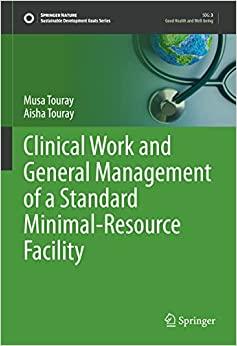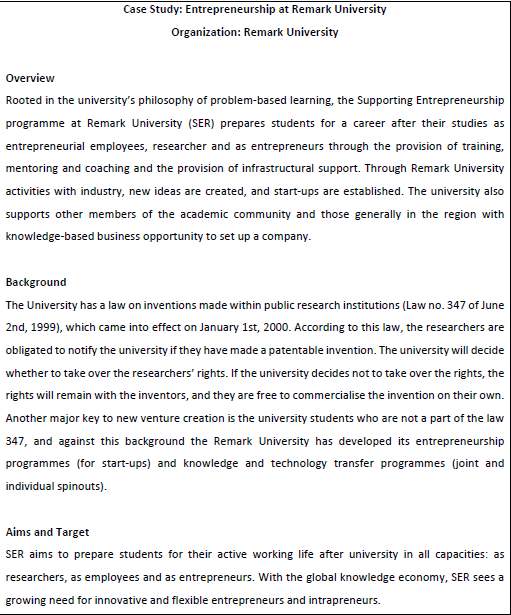
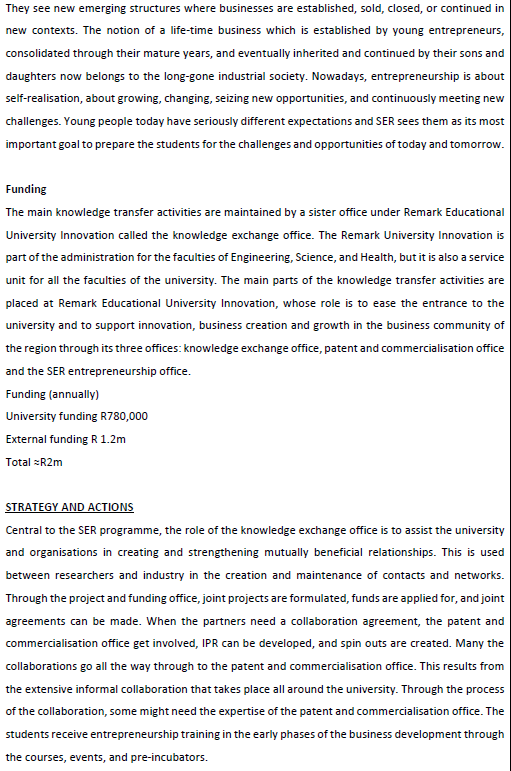
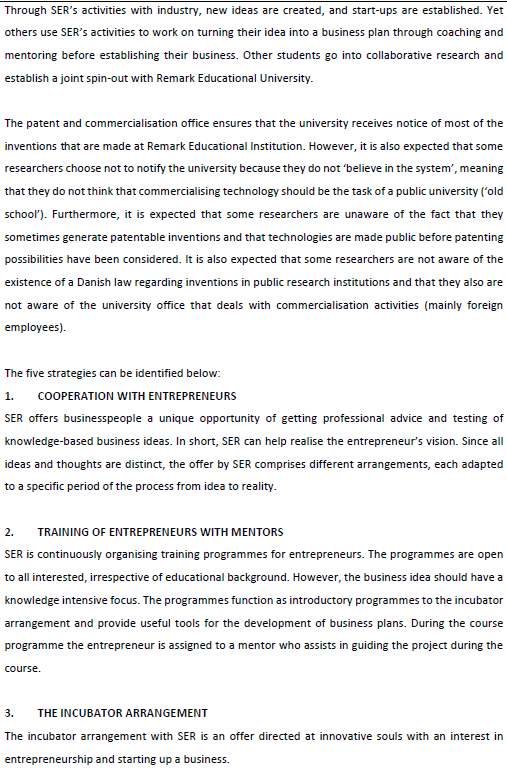
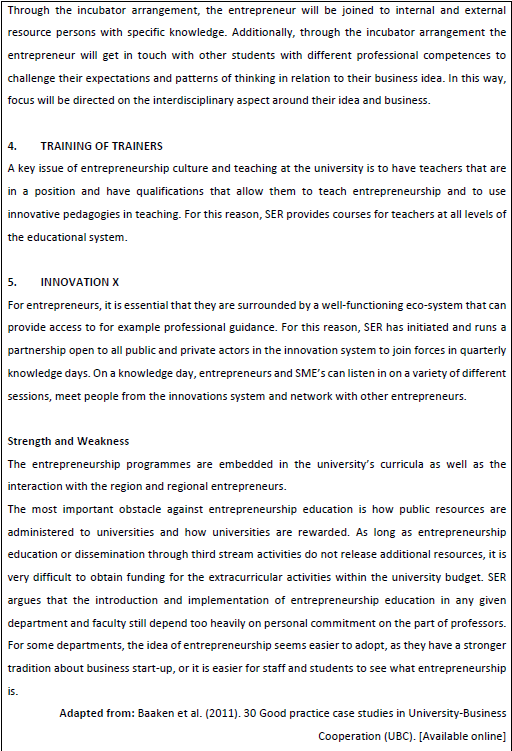

Case Study: Entrepreneurship at Remark University Organization: Remark University Overview Rooted in the university's philosophy of problem-based learning, the Supporting Entrepreneurship programme at Remark University (SER) prepares students for a career after their studies as entrepreneurial employees, researcher and as entrepreneurs through the provision of training, mentoring and coaching and the provision of infrastructural support. Through Remark University activities with industry, new ideas are created, and start-ups are established. The university also supports other members of the academic community and those generally in the region with knowledge-based business opportunity to set up a company. Background The University has a law on inventions made within public research institutions (Law no. 347 of June 2nd, 1999), which came into effect on January 1st, 2000. According to this law, the researchers are obligated to notify the university if they have made a patentable invention. The university will decide whether to take over the researchers' rights. If the university decides not to take over the rights, the rights will remain with the inventors, and they are free to commercialise the invention on their own. Another major key to new venture creation is the university students who are not a part of the law 347, and against this background the Remark University has developed its entrepreneurship programmes (for start-ups) and knowledge and technology transfer programmes (joint and individual spinouts). Aims and Target SER aims to prepare students for their active working life after university in all capacities: as researchers, as employees and as entrepreneurs. With the global knowledge economy, SER sees a growing need for innovative and flexible entrepreneurs and intrapreneurs. They see new emerging structures where businesses are established, sold, closed, or continued in new contexts. The notion of a life-time business which is established by young entrepreneurs, consolidated through their mature years, and eventually inherited and continued by their sons and daughters now belongs to the long-gone industrial society. Nowadays, entrepreneurship is about self-realisation, about growing, changing, seizing new opportunities, and continuously meeting new challenges. Young people today have seriously different expectations and SER sees them as its most important goal to prepare the students for the challenges and opportunities of today and tomorrow. Funding The main knowledge transfer activities are maintained by a sister office under Remark Educational University Innovation called the knowledge exchange office. The Remark University Innovation is part of the administration for the faculties of Engineering, Science, and Health, but it is also a service unit for all the faculties of the university. The main parts of the knowledge transfer activities are placed at Remark Educational University Innovation, whose role is to ease the entrance to the university and to support innovation, business creation and growth in the business community of the region through its three offices: knowledge exchange office, patent and commercialisation office and the SER entrepreneurship office. Funding (annually) University funding R780,000 External funding R1.2m Total R2m STRATEGY AND ACTIONS Central to the SER programme, the role of the knowledge exchange office is to assist the university and organisations in creating and strengthening mutually beneficial relationships. This is used between researchers and industry in the creation and maintenance of contacts and networks. Through the project and funding office, joint projects are formulated, funds are applied for, and joint agreements can be made. When the partners need a collaboration agreement, the patent and commercialisation office get involved, IPR can be developed, and spin outs are created. Many the collaborations go all the way through to the patent and commercialisation office. This results from the extensive informal collaboration that takes place all around the university. Through the process of the collaboration, some might need the expertise of the patent and commercialisation office. The students receive entrepreneurship training in the early phases of the business development through the courses, events, and pre-incubators. Through SER's activities with industry, new ideas are created, and start-ups are established. Yet others use SER's activities to work on turning their idea into a business plan through coaching and mentoring before establishing their business. Other students go into collaborative research and establish a joint spin-out with Remark Educational University. The patent and commercialisation office ensures that the university receives notice of most of the inventions that are made at Remark Educational Institution. However, it is also expected that some researchers choose not to notify the university because they do not 'believe in the system', meaning that they do not think that commercialising technology should be the task of a public university ('old school'). Furthermore, it is expected that some researchers are unaware of the fact that they sometimes generate patentable inventions and that technologies are made public before patenting possibilities have been considered. It is also expected that some researchers are not aware of the existence of a Danish law regarding inventions in public research institutions and that they also are not aware of the university office that deals with commercialisation activities (mainly foreign employees). The five strategies can be identified below: 1. COOPERATION WITH ENTREPRENEURS SER offers businesspeople a unique opportunity of getting professional advice and testing of knowledge-based business ideas. In short, SER can help realise the entrepreneur's vision. Since all ideas and thoughts are distinct, the offer by SER comprises different arrangements, each adapted to a specific period of the process from idea to reality. 2. TRAINING OF ENTREPRENEURS WITH MENTORS SER is continuously organising training programmes for entrepreneurs. The programmes are open to all interested, irrespective of educational background. However, the business idea should have a knowledge intensive focus. The programmes function as introductory programmes to the incubator arrangement and provide useful tools for the development of business plans. During the course programme the entrepreneur is assigned to a mentor who assists in guiding the project during the course. 3. THE INCUBATOR ARRANGEMENT The incubator arrangement with SER is an offer directed at innovative souls with an interest in entrepreneurship and starting up a business. Through the incubator arrangement, the entrepreneur will be joined to internal and external resource persons with specific knowledge. Additionally, through the incubator arrangement the entrepreneur will get in touch with other students with different professional competences to challenge their expectations and patterns of thinking in relation to their business idea. In this way, focus will be directed on the interdisciplinary aspect around their idea and business. 4. TRAINING OF TRAINERS A key issue of entrepreneurship culture and teaching at the university is to have teachers that are in a position and have qualifications that allow them to teach entrepreneurship and to use innovative pedagogies in teaching. For this reason, SER provides courses for teachers at all levels of the educational system. 5. INNOVATION X For entrepreneurs, it is essential that they are surrounded by a well-functioning eco-system that can provide access to for example professional guidance. For this reason, SER has initiated and runs a partnership open to all public and private actors in the innovation system to join forces in quarterly knowledge days. On a knowledge day, entrepreneurs and SME's can listen in on a variety of different sessions, meet people from the innovations system and network with other entrepreneurs. Strength and Weakness The entrepreneurship programmes are embedded in the university's curricula as well as the interaction with the region and regional entrepreneurs. The most important obstacle against entrepreneurship education is how public resources are administered to universities and how universities are rewarded. As long as entrepreneurship education or dissemination through third stream activities do not release additional resources, it is very difficult to obtain funding for the extracurricular activities within the university budget. SER argues that the introduction and implementation of entrepreneurship education in any given department and faculty still depend too heavily on personal commitment on the part of professors. For some departments, the idea of entrepreneurship seems easier to adopt, as they have a stronger tradition about business start-up, or it is easier for staff and students to see what entrepreneurship is. Adapted from: Baaken et al. (2011). 30 Good practice case studies in University-Business Cooperation (UBC). [Available online] Design a business case document to justify why the incubator arrangement is a good strategy to promote entrepreneurship











